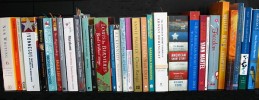
photo by Luis Herrera
by Mike Smith
I have been struck recently by how a single word has stuck in my mind after reading a particular short story.
In his discussion of repetition, as part of the collection of essays in The Language of Fiction (1984), David Lodge[1] examines ideas of the ‘keyword’ in a narrative fiction. He quotes Conrad in defining the term as ‘a word that could stand at the back of all the words covering the page’. Lodge is examining the novel in this essay, but could the same also be true of shorter pieces?
An exercise I have used in creative writing workshops is to ask participants to reduce a thousand-word story to just one hundred words, reducing it first to 500 words, then to 250 words, and finally to 100. The idea is to help us get to grips with the essence of the story. Progressively, we eat into what we think of as the different levels of importance such as particular details of setting and roundness of characterisation, and shave away at the excess: phrasal verbs are reduced to single words; adjectives are discarded; repetitions and tautologies are ruthlessly removed. We cut parallel actions and shades of meaning. We find the single action that will encapsulate the idea behind all the actions. From 100 words we go further; to 50 words; to 25. We work down below 10. Ultimately, we look for a phrase or a single word. By this time it is not uncommon to find that we are describing the essence of the story, rather than representing it. We are providing a label for the story, not a version of it. There are honourable exceptions, well quoted elsewhere: I came. I saw. I conquered.
Occasionally, the word we end up with is not even in the original story but is, instead, a word that stands behind it. The current popularity of flash fictions takes us some way down this road, although these pieces, to me, often seem to be fragments of larger stories, rather than complete, essential stories in their own right. Sometimes, the word we are left with is an image, and Lodge uses the example of fire in Charlotte Bronte’s Jane Eyre. Alternatively, the general imagery of a book may suggest the keyword. Darkness, in Heart of Darkness is also quoted by Lodge.
At the risk of telling you more about me than about the essence of the story, I have to say that in Anton Chekhov’s Rothschild’s Fiddle, it is the word ‘Vachhh’ that stands out for me. It is a word that demands to be uttered aloud. Vachhh! I imagine, and pronounce it with all of its three elements exaggerated: Vvv-aaa-chhh! I can taste the resigned realisation in it. Vvv-aaa-chhh! It is a long verbal shrug; a ripple of muscle talking the weight of the world on its shoulders. If you haven’t tried it aloud by now, here’s another chance: Vvv-aaa-chhh!
The fact that it is probably the only word, in the translated version that I read, that carries the full expressive weight of the language in which it was originally written, and the least tampered with, may be more than co-incidental. Perhaps Vachhh!, like various other gasps, phews, achs, ochs and ohs, is a bit of pre-literate language that has found its way onto the printed page, and which communicates on almost any tongue.
Rothschild says it only twice, towards the end of the circa three thousand-word story: once upon hearing the fiddle played, and again on playing it himself. In this story, where the burden of understanding, along with the fiddle, is passed from Yakov to Rothschild, and from Rothschild to us, Vachhh! is the symbol and expression of taking the strain. It is loaded with all the emotional weight that Yakov has accumulated during the story. He has lost his wife, and has re-evaluated his life. He has re-imagined what it might have been, and has re-visited what it once was. He has remembered the loss of his baby girl in contrast to the monetary losses that he meticulously records in his account books. He has reconciled himself to death, and to Rothschild, whom he addresses as ‘brother’.
It is after this recognition that Yakov plays his violin for the last time:
And he began playing again, and the tears gushed from his eyes on to the fiddle. Rothschild listened attentively, standing sideways to him and folding his arms on his chest. The scared and perplexed expression on his face, little by little, changed to a look of woe and suffering; he rolled his eyes as though he were experiencing an agonizing ecstasy, and articulated, “Vachhh!” and tears slowly ran down his cheeks and trickled on his greenish coat.
At the end of the next and penultimate paragraph, the dying Yakov says ‘give the fiddle to Rothschild.’ The final paragraph sees Rothschild with the fiddle, in the wider world, empowered by it, yet also a vehicle for its message:
…but when he tries to repeat what Yakov played, sitting in the doorway, the effect is something so sad and sorrowful that his audience weep, and he himself rolls his eyes and articulates “Vachhh!…”
(A Single Word won a Muriel Carmichael Prize at Glasgow University’s Crichton Campus, Dumfries in 2010)
[1] All the David Lodge references are on pp82/3 of the RKP paperback edition.


A single word story is, I agree, a challenge!
I found a monthly mobile phone competition that extends this a little to 154 characters of text (including spacing and punctuation) so basically not much more than a sentence!
I smugly submitted my attempt of 147 characters….
The competition describes itself thus: ‘At txtlit.co.uk we provide a platform where you can test your writing skill…..through what we believe to be the easiest to enter writing competition in the UK.’
Easy – no, but I did find it quite a good exercise and for their February challenge in the genre of ‘sci-fi’ they published my offering as a runner up:
How quickly the human body repairs itself. Kai’s new head even had the hair he’d lost since turning 120. But what point if just to re-join the war?
I’m reminded of Bruce Taylor’s short-short story, ‘Exercise’ which illustrates a story being divided in half and half again for the reader to watch: http://www.vestalreview.net/exercise.htm I think this process of hard pruning be very useful, particularly when writing flash fiction, although I’m not sure I could ever quite distill a story to a single word.